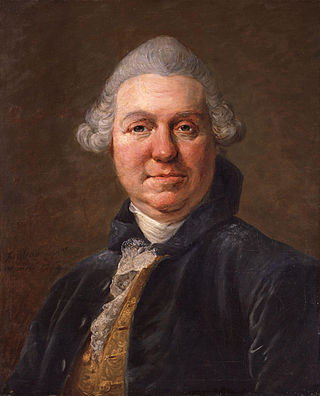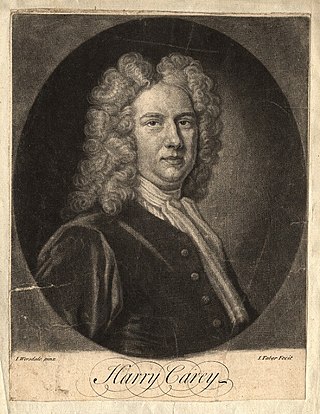
Henry Fielding was an English writer and magistrate known for the use of humour and satire in his works. His 1749 comic novel The History of Tom Jones, a Foundling was a seminal work in the genre. Along with Samuel Richardson, Fielding is seen as the founder of the traditional English novel. He also played an important role in the history of law enforcement in the United Kingdom, using his authority as a magistrate to found the Bow Street Runners, London's first professional police force.
The Master of the Revels was the holder of a position within the English, and later the British, royal household, heading the "Revels Office" or "Office of the Revels". The Master of the Revels was an executive officer under the Lord Chamberlain. Originally he was responsible for overseeing royal festivities, known as revels, and he later also became responsible for stage censorship, until this function was transferred to the Lord Chamberlain in 1624. However, Henry Herbert, the deputy Master of the Revels and later the Master, continued to perform the function on behalf of the Lord Chamberlain until the English Civil War in 1642, when stage plays were prohibited. The office continued almost until the end of the 18th century, although with rather reduced status.
This article lists notable literary events and publications in 1599.

The Lord Chamberlain of the Household is the most senior officer of the Royal Household of the United Kingdom, supervising the departments which support and provide advice to the Sovereign of the United Kingdom while also acting as the main channel of communication between the Sovereign and the House of Lords. The office organises all ceremonial activity such as garden parties, state visits, royal weddings, and the State Opening of Parliament. They also oversee the Royal Mews and Royal Travel, as well as the ceremony around the awarding of honours.

Samuel Foote was a British dramatist, actor and theatre manager. He was known for his comedic acting and writing, and for turning the loss of a leg in a riding accident in 1766 to comedic opportunity.

Henry Carey was an English poet, dramatist and songwriter. He is remembered as an anti-Walpolean satirist and also as a patriot. Several of his melodies continue to be sung today, and he was widely praised in the generation after his death. Because he worked in anonymity, selling his own compositions to others to pass off as their own, contemporary scholarship can only be certain of some of his poetry, and a great deal of the music he composed was written for theatrical incidental music. However, under his own name and hand, he was a prolific songwriter and balladeer, and he wrote the lyrics for almost all of these songs. Further, he wrote numerous operas and plays. His life is illustrative of the professional author in the early 18th century. Without inheritance or title or governmental position, he wrote for all of the remunerative venues, and yet he also kept his own political point of view and was able to score significant points against the ministry of the day. Further, he was one of the leading lights of the new "Patriotic" movement in drama.

The Licensing Act 1737 is a former Act of Parliament in the Kingdom of Great Britain, and a pivotal moment in British theatrical history. Its purpose was to control and censor what was being said about the British government through theatre. The act was repealed by the Theatres Act 1843, which was itself replaced by the Theatres Act 1968. The Lord Chamberlain was the official censor and the office of Examiner of Plays was created under the Act. The Examiner assisted the Lord Chamberlain in the task of censoring all plays from 1737 to 1968. The Examiner read all plays which were to be publicly performed, produced a synopsis and recommended them for licence, consulting the Lord Chamberlain in cases of doubt. The act also created a legal distinction between categories of "legitimate theatre" and "illegitimate theatre".

Augustan literature is a style of British literature produced during the reigns of Queen Anne, King George I, and George II in the first half of the 18th century and ending in the 1740s, with the deaths of Alexander Pope and Jonathan Swift, in 1744 and 1745, respectively. It was a literary epoch that featured the rapid development of the novel, an explosion in satire, the mutation of drama from political satire into melodrama and an evolution toward poetry of personal exploration. In philosophy, it was an age increasingly dominated by empiricism, while in the writings of political economy, it marked the evolution of mercantilism as a formal philosophy, the development of capitalism and the triumph of trade.
Chrononhotonthologos is a satirical play by the English poet and songwriter Henry Carey from 1734. Although the play has been seen as nonsense verse, it was also seen and celebrated at the time as a satire on Robert Walpole and Queen Caroline, wife of George II.

The Theatres Act 1968 abolished stage censorship in the United Kingdom, receiving royal assent on 26 July 1968, after passing both Houses of Parliament.

Charlotte Charke was an English actress, playwright, novelist, and autobiographer. She began acting at the age of seventeen in breeches roles, and took to wearing male clothing off stage as well, performing and being publicly known as "Charles Brown" from 1741. Her later career and her writings were conducted under her own name, "Mrs. Charlotte Charke", and identified her as the daughter of Colley Cibber. After being unsuccessful in a series of jobs associated with men at the time, such as valet, sausage maker, farmer, and tavern owner, she succeeded in her career as a writer and continued her work as a novelist and memoirist until her death in 1760.

The patent theatres were the theatres that were licensed to perform "spoken drama" after the Restoration of Charles II as King of England, Scotland and Ireland in 1660. Other theatres were prohibited from performing such "serious" drama, but were permitted to show comedy, pantomime or melodrama. Drama was also interspersed with singing or dancing, to prevent the whole being too serious or dramatic.

Augustan drama can refer to the dramas of Ancient Rome during the reign of Caesar Augustus, but it most commonly refers to the plays of Great Britain in the early 18th century, a subset of 18th-century Augustan literature. King George I referred to himself as "Augustus," and the poets of the era took this reference as apropos, as the literature of Rome during Augustus moved from historical and didactic poetry to the poetry of highly finished and sophisticated epics and satire.

The Theatres Act 1843 is a defunct Act of Parliament in the United Kingdom. It amended the regime established under the Licensing Act 1737 for the licensing of the theatre in Great Britain, implementing the proposals made by a select committee of the House of Commons in 1832.
Legitimate theatre is live performance that relies almost entirely on diegetic elements, with actors performing through speech and natural movement. Traditionally, performances of such theatre were termed legitimate drama, while the abbreviation the legitimate refers to legitimate theatre or drama and legit is a noun referring both to such dramas and actors in these dramas. Legitimate theatre and dramas are contrasted with other types of stage performance such as musical theatre, farce, revue, melodrama, burlesque and vaudeville, as well as recorded performances on film and television.

The Happy Land is a play with music written in 1873 by W. S. Gilbert and Gilbert Arthur à Beckett. The musical play burlesques Gilbert's earlier play, The Wicked World. The blank verse piece opened at the Royal Court Theatre on 3 March 1873 and enjoyed a highly successful run, soon touring, and then being immediately revived at the same theatre in the autumn of 1873.
The Golden Rump is a farcical play of unknown authorship said to have been written in 1737. It acted as the chief trigger for the Theatrical Licensing Act of 1737. The play has never been performed on stage or published in print. No manuscript of the play survives, casting some doubt over whether it ever existed in full at all. The authorship of the play has often been ascribed to Henry Fielding, at that time a popular and prolific playwright who often turned his incisive satire against the monarch, George II, and particularly the "prime minister", Sir Robert Walpole. Modern literary historians, however, increasingly embrace the opinion that The Golden Rump may have been secretly commissioned by Walpole himself in a successful bid to get his Bill for theatrical licensing passed before the legislature.
The Whim is a play written by Eglantine Wallace in 1795. The play was banned under the Licensing Act 1737 and never performed. It was published that same year with an indignant subtitle and went into a second edition:
With an address to the public, upon the arbitrary and unjust aspersion of the licenser against its political sentiments. Offered to be acted for the benefit of the Hospital and Poor of the Isle of Thanet, but refused The Royal Licence.
Henry Giffard (1694–1772) was a British stage actor and theatre manager.

Pasquin is a 1736 comedy play by Henry Fielding. It is a satire on both politics and the theatre, with a play within a play plot about a group of actors attempting to put on a production about a local election. It takes its name from Pasquin, a historic statue in Rome.












